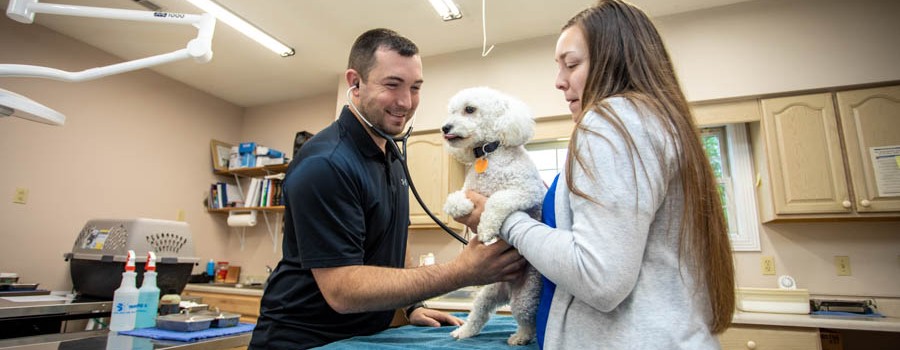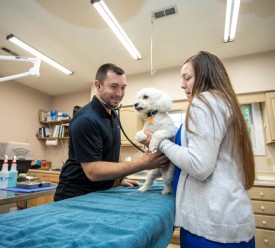Improve the lives of animals by giving them treatment, care, and kindness!
If you aspire to serve the health and welfare needs of animals – not to mention helping the animals’ owners feel more at ease knowing their beloved pet is in good hands – then a pre-veterinary degree program could be exactly what you need. A pre-veterinary degree program can make a difference in your career and in the lives of the creatures you serve by preparing you for veterinary school. Our pre-vet program will give you the skills you need for a rewarding role in the veterinary field. This program can also open the door to a variety of different careers in the world of natural science.
By the Numbers
$100,370
19%
1 in 5
96%
Programs & Requirements
* The credit hours listed on this page only reference the specific program requirements and is not reflective of the total hours necessary to receive your degree. Cumberlands requires all students obtain a minimum of 60 hours for an associate’s degree and a total of 120 hours for a bachelor’s degree. Transfer and prior learning credits may be counted toward those totals.
To learn more about our General Education Requirements, please visit the page referenced below or explore our Academic Catalog.
This track gives you depth in your knowledge of biology especially. The pre-vet program at UC will prepare you for your advanced veterinary science studies by giving you a well-rounded undergraduate foundation. In addition to biology courses, you’ll work with knowledgeable professors and take classes in general subjects, including English, mathematics, social sciences and the humanities. This program enriches pre-vet students with general studies that have emphasis on natural sciences that will give you the tools you need to thrive in a veterinary school program!
Course Requirements
Students interested in applying to medical, dental, or veterinary school are strongly encouraged to complete these courses. It is important to review the admissions requirements requirements for each program to which you will apply because the prerequisites for admission may be slightly different among professional schools.
- BIOL 331 - Vertebrate Embryology
- BIOL 342 - Parasitology
- BIOL 345 - Microbiology
- BIOL 346 - Biochemistry
- BIOL 436 - Medical Biochemistry
- BIOL 441 - Immunology
- BIOL 442 - Comparative Anatomy
- BIOL 443 - General Physiology
- BIOL 445 - Molecular Biology
- BIOL 446 - Advanced Cell Biology
- BIOL 447 - Histology
This option is recommended for students entering a “blended” area such as pre-professional medically related areas (medicine, dentistry, pharmacy, physician assistant, physical therapist, etc.), chemistry/business, and chemistry/biology.
MATH 140, MATH 240, PHYS 241, and PHYS 242 are prerequisites for some upper-level chemistry courses.
- CHEM 132 - General College Chemistry I
- CHEM 111 - General Chemistry Laboratory I
- CHEM 232 - General College Chemistry II
- CHEM 211 - General Chemistry Laboratory II
- CHEM 331 - Organic Chemistry I
- CHEM 321 - Organic Chemistry Laboratory I
- CHEM 332 - Organic Chemistry II
- CHEM 322 - Organic Chemistry Laboratory II
- CHEM 336 - Analytical Chemistry
- CHEM 328 - Analytical Chemistry Laboratory
- CHEM 441 - Physical Chemistry I with Laboratory
- CHEM 434 - Inorganic Chemistry
- CHEM 490 - Senior Research Project
- CHEM 491 - Selected Topics in Chemistry
A Bachelor of Arts degree requires completing the same courses as a Bachelor of Science with the addition of completing one foreign language sequence through the intermediate level.
- FREN 131 Elementary French I
- FREN 132 Elementary French II
- FREN 231 Intermediate French I
- FREN 232 Intermediate French II
- SPAN 131 Elementary Spanish I
- SPAN 132 Elementary Spanish II
- SPAN 231 Intermediate Spanish I
- SPAN 232 Intermediate Spanish II
Take the Next Step
Program Mission
The purpose of the pre-veterinary program is to prepare students to have a successful veterinary education and reach their career goals. We’re here to prepare you for higher education so you can begin helping animals through your career.
Pre-Veterinary Careers & Outcomes
All stats from U.S. Bureau of Labor Statistics.
Veterinarian: $103,700
Veterinarian: $103,700
Care for the health of animals and work to protect public health.
Veterinarian Technician: $36,850
Veterinarian Technician: $36,850
Veterinary technologists and technicians do medical tests that help diagnose animals’ injuries and illnesses.
Animal Care Worker: $28,730
Animal Care Worker: $28,730
Animal care and service workers attend to or train animals. They are employed in a variety of settings, including kennels, zoos, stables, animal shelters, pet stores, veterinary clinics, and aquariums.
Natural Sciences Manager: $137,900
Natural Sciences Manager: $137,900
Natural sciences managers supervise the work of scientists, including chemists, physicists, and biologists.
Livestock Handler: $29,680
Livestock Handler: $29,680
Agricultural and livestock workers maintain crops and tend livestock. Agricultural workers usually do their tasks outdoors in all kinds of weather. Most work full-time, and some work more than 40 hours per week.
Medical Service Manager: $101,340
Medical Service Manager: $101,340
Medical and health services managers plan, direct, and coordinate the business activities of healthcare providers.
Common Questions
A pre-veterinary degree is a preparatory program designed to equip students with the foundational knowledge and skills necessary for admission to veterinary school. The program focuses on the study of natural sciences, biology, chemistry, and related subjects, providing a strong academic background for those aspiring to become veterinarians.
A pre-veterinary degree typically takes four years to complete when pursued as a full-time bachelor's program. This program includes both general education requirements and specialized courses in the natural sciences, totaling 55 credit hours specific to pre-veterinary studies.
While it may be possible to take some pre-veterinary courses online, a full pre-veterinary degree typically requires hands-on experience, such as laboratory work and clinical practice, which are difficult to replicate in an online format. Therefore, most programs would likely require some on-campus attendance for practical components.
A pre-veterinary degree is worth it for those who are passionate about animal health and welfare and wish to pursue a career as a veterinarian. It provides the necessary preparation for veterinary school and opens up various career opportunities in the veterinary and natural science fields. With a growing demand for veterinarians and related professionals, this degree can lead to a rewarding and well-compensated career.
With a pre-veterinary degree, you can pursue various careers in animal care and natural sciences, such as becoming a veterinarian, veterinary technician, animal care worker, livestock handler, or natural sciences manager. The degree also prepares you for further education and specialization in veterinary medicine or related fields.
To obtain a pre-veterinary degree, you need to enroll in an accredited pre-veterinary program, such as the one offered by University of the Cumberlands. The program will include general education courses, as well as specialized courses in biology, chemistry, and other sciences. Completing the degree prepares you for veterinary school and a future career in animal health.
The best degree for a pre-vet student is one that provides a strong foundation in the sciences, particularly biology and chemistry. A pre-veterinary program with a biology or chemistry track is ideal, as it covers the necessary coursework and prepares you for the rigorous demands of veterinary school.
Faculty Experts in Pre-Veterinary Science
Learn more about the pre-veterinary science professors you will interact with.

Ms. Kara Stanley

Dr. Leif Deyrup
Dr. Leif Deyrup
Contact Information

Dr. Joan Hembree
Dr. Joan Hembree
Contact Information
Request Information
You have questions? We have answers.

